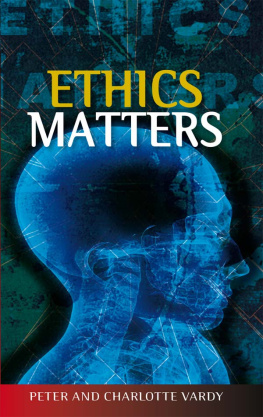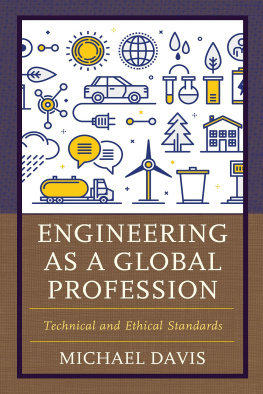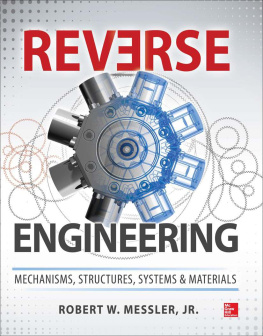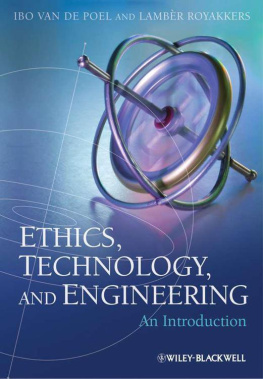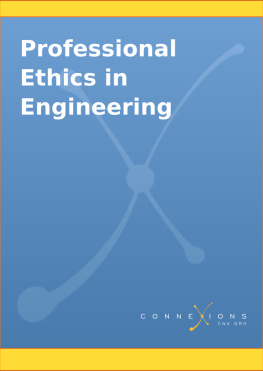Eugene Schlossberger - The Ethical Engineer: An Ethics Construction Kit Places Engineering in a New Light
Here you can read online Eugene Schlossberger - The Ethical Engineer: An Ethics Construction Kit Places Engineering in a New Light full text of the book (entire story) in english for free. Download pdf and epub, get meaning, cover and reviews about this ebook. publisher: Temple University Press, genre: Romance novel. Description of the work, (preface) as well as reviews are available. Best literature library LitArk.com created for fans of good reading and offers a wide selection of genres:
Romance novel
Science fiction
Adventure
Detective
Science
History
Home and family
Prose
Art
Politics
Computer
Non-fiction
Religion
Business
Children
Humor
Choose a favorite category and find really read worthwhile books. Enjoy immersion in the world of imagination, feel the emotions of the characters or learn something new for yourself, make an fascinating discovery.

- Book:The Ethical Engineer: An Ethics Construction Kit Places Engineering in a New Light
- Author:
- Publisher:Temple University Press
- Genre:
- Rating:4 / 5
- Favourites:Add to favourites
- Your mark:
- 80
- 1
- 2
- 3
- 4
- 5
The Ethical Engineer: An Ethics Construction Kit Places Engineering in a New Light: summary, description and annotation
We offer to read an annotation, description, summary or preface (depends on what the author of the book "The Ethical Engineer: An Ethics Construction Kit Places Engineering in a New Light" wrote himself). If you haven't found the necessary information about the book — write in the comments, we will try to find it.
The Ethical Engineer: An Ethics Construction Kit Places Engineering in a New Light — read online for free the complete book (whole text) full work
Below is the text of the book, divided by pages. System saving the place of the last page read, allows you to conveniently read the book "The Ethical Engineer: An Ethics Construction Kit Places Engineering in a New Light" online for free, without having to search again every time where you left off. Put a bookmark, and you can go to the page where you finished reading at any time.
Font size:
Interval:
Bookmark:
The Ethical Engineer
THE ETHICAL ENGINEER
Eugene Schlossberger

TEMPLE UNIVERSITY PRESS
philadelphia
Temple University Press, Philadelphia 19122
Copyright 1993 by Temple University. All rights reserved
Published 1993
Printed in the United States of America
The paper used in this publication meets the minimum requirements of American National Standard for Information SciencesPermanence of Paper for Printed Library Materials, ANSI Z39.48-1984
Library of Congress Cataloging-in-Publication Data
Schlossberger, Eugene, 1951
The ethical engineer / Eugene Schlossberger.
p. cm.
Includes bibliographical references and index.
ISBN 1-56639-056-7 (CL) ISBN 1-56639-057-5 (PB) 1. Engineering ethics. I. Title.
TA157.S383 1993
174'.962dc20 92-38317
For my brother, Norman
These materials discuss the ethical, not the legal, aspects of engineering and technologically oriented business. These materials must not be used as a substitute for legal advice. Laws change and vary from place to place. Because the engineer and the company both have a duty to obey the law, every recommendation made in these pages should be understood as containing the phrase "provided there is no legal duty to do otherwise."
PART ONE
Introduction
The Nature of Engineering Ethics
What This Book Is About
This book is a practical guide to ethical decision making for practicing engineers and others in technologically oriented business and industry. It will help you to make ethical decisions yourself and to understand the reasons behind company policies, legal rules, and professional codes. It is also meant to change the way you think and feel about engineering, so that you can be a better and happier engineer. And it just may cause you to take a new look at the ethical dimensions of life generally.
Unlike many ethics books, this one is geared to finding answers. I have attempted to present clearly and economically some factors you may use in making decisions. To make it easy to use this book as a reference or study guide, I have listed key points in Appendix 2. Of course, there is no such thing as an ethics rule book. Rather, what you need is an ethics construction kit that provides you with tools and materials to construct your own solutions to problems you may face. This book imparts some specific recommendations, many examples of ethical decisions, several tech niques for ethical decision making, and a variety of rules, principles, and values upon which you can draw. It explains the reasons behind many of the rules and principles and gives you guidance in weighing them.
I have tried to capture and summarize the best in the literature of engineering ethics and also to add a good deal that is new. Some of my recommendations are quite specific, others fairly general. Some of the material will raise new ideas, while some details represent a clear and thorough summary of "common sense." Some of my recommendations are controversial, others are widely agreed upon.
Together, these materials present a comprehensive picture of and guide to engineering ethics.
Why Ethics for Engineers?
Practicing engineers often think that ethical problems are not really their concern. Many ethical decisions are not made by any individual. After all, legal and company rules determine much of what an engineer may or may not do, and committees or executives far removed from the average engineer decide many of the ethical questions that do arise. Of what use, then, is a book or program or course on engineering ethics?
Books such as this one are essential because, for several reasons, engineers must have a clear grasp of engineering ethics. First, many of the ethical decisions that individual engineers must make are not settled by rules. After all, rules do not encompass every situation: often the rules only set limits within which decisions must be made, and some situations are not covered at all.1 In addition, rules require interpretation. In some cases it may be easy to see which interpretation of a rule is best, but in others it is not so easy. No set of rules or policies can anticipate every ethical problem that may arise, and even the sincerest engineers may need help in understanding the ethical aspects of some situations. So only ethically aware engineers can correctly apply ethical rules to complex situations, keeping to the spirit as well as the letter of ethical rules.
Second, organizations function best when the values implicit in rules and executive decisions are widely understood and discussed within the organization. The best employment situation, both for the employer and for the employees, is a community atmosphere where everyone works together for a common goal in which everyone believes. Companies and firms flourish when their people have common values, a situation impossible to achieve if the rules are bureaucratic mandates handed down from above rather than ways of working toward commonly understood goals. Furthermore, without communication between all levels of an organization, ethical problems may slip between the cracks. Such synergistic effects arise when employees are insensitive to complex ethical dimensions of company operations. It becomes more difficult to overlook ethical problems when each engineer is aware of and sensitive to ethical concerns and potential problems. In general, large decisions are often the resultant of many small decisions made at different levels. Thus, the large decisions reflect the values and ethical aims of the company only when those making the small decisions understand those values and aims and also understand how their decisions fit in with the ethical outlook of the company. In addition, engineers who understand the moral basis of the rules have a greater motivation to obey them, both because they see the rules as morally sound directives rather than as annoying and senseless restrictions and because there is less incentive to make one's own "numbers" look better if the company functions as a community rather than as an arena in which individual''gladiators'' can better their own prospects. Moreover, the single most powerful influence on the operation of a firm or company is its corporate climate. John Fleming notes, "An ethical climate involves the total organization and must pervade and infuse all who work for the company."2 Although the corporate climate is heavily influenced by those at the top, people who advance in the corporation tend to take with them the attitudes they learned before being promoted. And so, Donald Jones advises, "the best time to give ethics training to senior managers is before they become senior executives."3
Third, engineers should be sensitive to ethical questions because engineers who understand the ethical dimension of engineering are better and happier engineers. Engineers will be happier in a company in which every engineer understands the value of community, since a community atmosphere requires everyone's participation and it is more pleasant and rewarding to work in a place with a community atmosphere. Engineers who understand the "engineering way" and the values of engineering as a profession, who see engineering as serving a high social goal, will put more into (and take more satisfaction in) their work than those who view engineering merely as a way of drawing a paycheck.
From the employer's standpoint, employing ethically sensitive engineers has several benefits. First, ethics is good business. Ethical sensitivity often avoids costly situations. Although acting ethically often costs more in the short run, acting unethically usually costs more in the tong run. Engineers and businesspersons are sometimes tempted to act unethically because the benefits of unethical conduct are immediate and highly visible, while the benefits of ethical conduct are often long-term and hard to calculate. For example, an employer can easily show exactly how much money is being saved when the company denies a worker a $2,000 bonus to which he is entitled. What an employer loses by treating employees unfairly, although real, is more difficult to calculate. The financial effects of a community atmosphere, of employee loyalty, of good engineers coming to work for the firm because the firm has a good reputation, and so forth are indirect. While employee motivation certainly affects productivity, it is impossible to point to the particular extra widgets produced by greater motivation. And no one can calculate precisely how many people refrained from buying Fords because of negative publicity surrounding the Pinto. Acting ethically and responsibly may prevent a costly government regulation, but no line in the budget documents the value of regulations that were not passed. No line in the budget shows the money saved by forestalling litigation as a result of good and fruitful communication with environmental groups. So a standard dollars-and-cents analysis will often fail to take account of the hidden but real costs of unethical decisions. Thus, a good understanding of the ethical dimensions of engineering decisions is a business neces sity. Gerald Ottoson contends, "Neglecting to take steps to insure an ethical corporate climate has proven to be an ill-considered risk for many organizations."4
Next pageFont size:
Interval:
Bookmark:
Similar books «The Ethical Engineer: An Ethics Construction Kit Places Engineering in a New Light»
Look at similar books to The Ethical Engineer: An Ethics Construction Kit Places Engineering in a New Light. We have selected literature similar in name and meaning in the hope of providing readers with more options to find new, interesting, not yet read works.
Discussion, reviews of the book The Ethical Engineer: An Ethics Construction Kit Places Engineering in a New Light and just readers' own opinions. Leave your comments, write what you think about the work, its meaning or the main characters. Specify what exactly you liked and what you didn't like, and why you think so.

